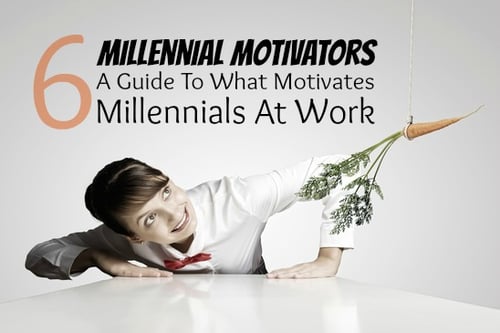Where there are unmotivated Millennial employees you will find uninspired leaders who lead teams of anxious, job-hop-in-a-heartbeat Millennials. For the leaders eager to spark change and energy into their organizations there are specific Millennial motivators that can be leveraged to ignite Millennial hustle and extend Millennial retention.
1) Innovation
- 78% of Millennials were strongly influenced by how innovative a company was when deciding if they wanted to work there. (The 2014 Millennial Study)
- 66% of Millennials work in organizations that actively encourage/reward its people for innovative ideas. (Deloitte)
Millennials want to change the world and they believe innovation is the catalyst. They will lean into their high-tech and hyper-connected upbringing to find answers to today’s complex problems. Innovation matters to Millennials…big time.
Example: LinkedIn has their own internal incubator where employees are encouraged to innovate. Once a quarter, employees can come up with a new idea, put a team together, and pitch their idea to the executive team. If their idea is approved, they are able to spend up to 3 months time dedicated to turning the idea into something that benefits the company.
2) Flexibility
- 73% of Millennials expect to be able to modify and customize their work computer; 63% will go around IT to find the solutions they need. (Mobile Enterprise)
- 69% of Millennials believe office attendance is unnecessary on a regular basis. (Cisco)
New research reveals employees (especially Millennials) get more done and have a better impression of their employer when they have workplace flexibility. Millennials are interested to customize their career tracks and the work that they do. Millennials grew up in an age of customization enabled by the Internet. They now expect a similar level of customization at work.
Example: Rigor, awarded best place to work in Atlanta for 2014, has a "work from anywhere, anytime" policy and a "take vacation whenever you want" policy. This flexibility builds trust with employees. The average Rigor employee only takes 10-20 days off a year.
Related Read: NGC #009: Leadership, Company Culture & Work Perks That Attract & Retain Young Talent With Craig Hyde [Podcast]
Example #2: Deloitte has a “Mass Career Customization” program that allows employees to change their work preferences. It’s kind of like a “choose You Own Adventure” book when it comes to when, where, and how they work.
3) Collaboration
- 74% of Millennials ranked a collaborative work environment as the first or second most important characteristic they look for in the workplace. (Forbes)
- 74% of Millennials prefer to collaborate in small groups. (IdeaPaint)
Millennials seek collaboration. They learn better and quicker in teams. And often times they will leverage their social networks to crowdsource their research or decision making. In fact, McKinsey predicts that social media has the potential to save companies $1.3 trillion, largely owing to improvements in intra-office collaboration.
Example: Treehouse, a company that teaches people how to build websites and apps, has an internal collaboration and project management tool called “Flow” where employees can propose projects and then recruit people for the project.
4) Development
- #1 reason Millennials leave organizations is lack of career opportunity. (Forbes)
- 50% of Millennials believe their organization could do more to develop future leaders. (Deloitte Millennial Study)
Millennials want a clear picture of what is expected of them in the workplace and what skills and experience are required to level-up and accomplish more at work.
Example: Dreamworks Animation, the 2,000+ person company with hits like Shrek, Rise of the Guardians, Antz, and others, allows any employee to pitch a movie idea to members of the executive team. More importantly, Dreamworks offers workshops and mentoring on how to make the movie pitches successful.
Related Read: 3 Shifts Every Employee Needs To Consider In Order To Thrive Tomorrow
5) Ownership
- 89% of Millennials would prefer to choose when and where they work rather than being placed in a 9-to-5 position. (Millennial Branding)
- 54% of Millennials either want to start a business or already have started one. (Kauffman Foundation)
Growing up in a time where the barriers for entrepreneurs have never been lower, Millennials embrace an entrepreneurial mindset. They desire ownership of their positions, tasks, and ultimately their careers. Plus they have been managing their own personal brands since the dawn of social media.
Example: Valve, a $4 billion dollar video game company, offers modular work where employees get to select the projects they work on the same way they would if they were freelancers. Employees have control of their work, and they own their outcomes.
6) Purpose
- 84% of Millennials say making a difference is more important than professional recognition. (Bentley’s University’s Center For Women and Business)
- 92% of Millennials believe businesses should be measured by more than their profits. (Deloitte)
Most Millennials define career success by how meaningful the work is. They are attracted to organizations with heavy impact and to leaders who can communicate the purposeful vision of the organization.
Example: At Warby Parker, an innovative eyeglass retailer, for every pair of glasses purchased, a pair is distributed to someone in need. It’s a one for one model much like Toms Shoes. So far, they’ve distributed over a million pairs of glasses to people in need. Their is a clear purpose for every pair sold. And the purpose of every employee’s work is bigger than themselves.
Related Read: 24 Rewarding Tactics And Ideas To Harness The Hustle Of Millennials
Question: What motivates you most at work?
Consider Ryan Jenkins to be your next Millennial/Generation Y or Generation Z keynote speaker by clicking here...
![]()






